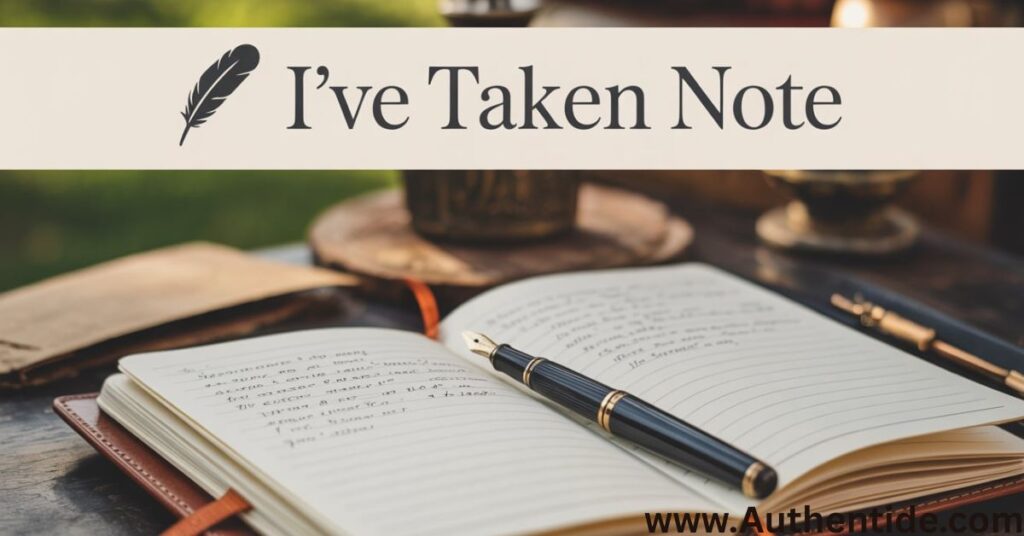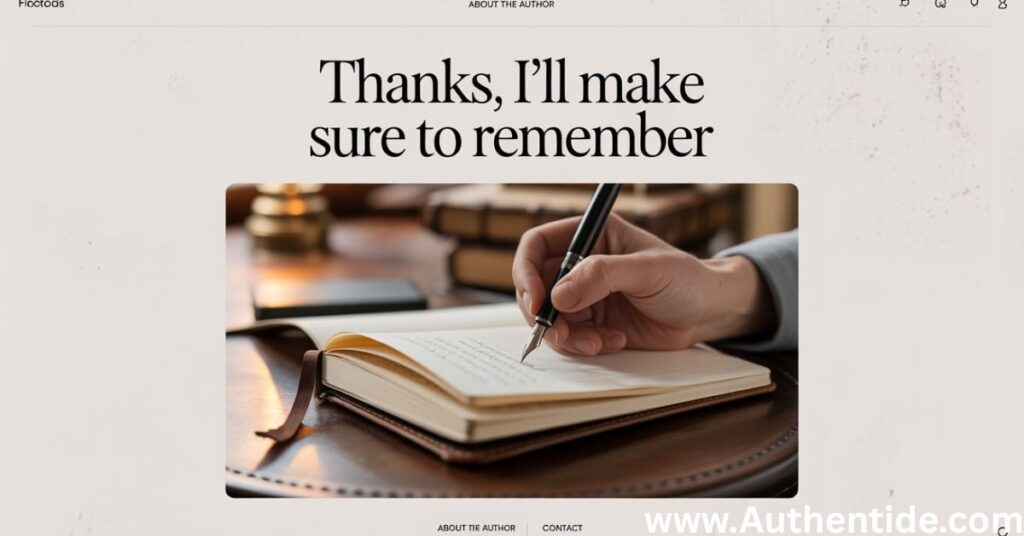Well, noted in an email is a phrase that frequently appears in professional and polite correspondence. It’s short, to the point, and confirms that you’ve received and understood what someone said. But over time, it can start to feel a bit too robotic or overused—especially in a business context where personal engagement matters. If you’re wondering how to respond in a way that’s still professional, but more varied and human, this guide has got you covered.
In a professional setting, clarity and tone matter. While phrases like “well noted” are acceptable in formal communications, using them repeatedly can make your emails sound stiff. The good news? There are plenty of natural, effective alternatives that help you acknowledge information, show appreciation, and respond to emails without sounding like a template.
Whether you’re a manager, a team member, or a client-facing professional, diversifying your language builds trust and adds warmth. In this guide, you’ll discover 35 powerful phrases that can replace “well noted,” complete with realistic email scenarios, explanations, and a touch of conversational flair.
What Does “Well Noted in an Email” Mean?
The phrase “well noted” means that you have received the message and understood its content. It’s an acknowledgment often used in business correspondence to confirm receipt of information.
But what’s the deeper well-noted meaning? In essence, it signals to the sender that their input has been received, understood, and will be acted upon if necessary. It’s a neutral, efficient phrase for formal communication, yet it may lack warmth and personal engagement.
When to Use “Well Noted in an Email”
Use it when you want to acknowledge receipt of a message in a clear, concise way. It’s particularly useful in:
- Project updates
- Task confirmations
- Acknowledging changes or decisions
- Confirming meeting notes or deliverables
For example:
“Well noted, Sarah. I’ll adjust the proposal and send it by Thursday.“
Still, if your goal is to show appreciation or build rapport, consider using alternatives.
Is It Professional/Polite to Say “Well Noted in an Email”?
Yes, it’s considered professional and polite, especially in formal or structured settings. However, it can come off as curt or emotionally detached. In high-stakes or nuanced communication, choosing a warmer phrase might suit the tone and context better.
For instance, when your colleague shares valuable information, responding with a phrase like “Thanks for the heads-up” or “Understood and appreciated” feels more human and engaging.
Pros and Cons Of “Well Noted in an Email”
Pros:
- Clear and concise
- Neutral and inoffensive
- Appropriate in most corporate communications
Cons:
- Can feel cold or impersonal
- Overused in formal emails
- Lacks emotional engagement
35 Alternatives to Say “Well Noted in an Email”
1. Understood and Appreciated

Email Example: “Thanks for the update, John. Understood and appreciated—I’ll proceed accordingly.”
2. Thanks for the Heads-Up
Email Example: “Thanks for the heads-up, Priya. I’ll prepare the documentation before Friday.”
3. Message Received Loud and Clear
Email Example: “Message received loud and clear. I’ll notify the team.”
4. Acknowledged with Thanks
Email Example: “Acknowledged with thanks, Ahmed. I’ll revise the document as discussed.”
5. Got It, Thanks for Letting Me Know
Email Example: “Got it, thanks for letting me know, Rachel. I’ll reschedule the session.”
6. Thanks for the Reminder

Email Example: “Thanks for the reminder—I’ve blocked my calendar for the call.”
7. Noted with Appreciation
Email Example: “Noted with appreciation, Carlos. Your insights are helpful.”
8. Got Your Message
Email Example: “Got your message—I’ll begin the edits right away.”
9. I Hear You
Email Example: “I hear you, and I’ll keep your feedback in mind during the review.”
10. I’ll Make a Note of That
Email Example: “Thanks, Henry. I’ll make a note of that for our next meeting.”
11. Consider It Noted
Email Example: “Consider it noted. I’ll ensure it’s part of the Q3 planning.”
12. I’ve Taken Note

Email Example: “I’ve taken note of your concerns, and I’ll bring them up with the vendor.”
13. Understood Completely
Email Example: “Understood completely. I’ll revise the scope as instructed.”
14. I’ll Take Care of It
Email Example: “Noted, and I’ll take care of it before noon.”
15. Thanks, I’m on It
Email Example: “Thanks, I’m on it and will follow up by COB today.”
16. I’ll Keep This in Mind

Email Example: “I’ll keep this in mind while preparing the next draft.”
17. Noted with Thanks
Email Example: “Noted with thanks, Emily. Looking forward to our next steps.”
18. I’ll Keep This on My Radar
Email Example: “Thanks, I’ll keep this on my radar for next quarter.”
19. Duly Noted
Email Example: “Duly noted, and I’ll adjust the figures accordingly.”
20. Thanks, I’ll Make Sure to Remember

Email Example: “Thanks, I’ll make sure to remember this when finalizing the timeline.”
21. Your Input Has Been Taken into Account
Email Example: “Your input has been taken into account. Thank you for sharing.”
22. Got the Details, Thanks
Email Example: “Got the details, thanks. This helps a lot.”
23. Noted and Will Follow Up as Needed
Email Example: “Noted and will follow up as needed. Appreciate the heads-up.”
24. I’ll Make a Note of It

Email Example: “Thanks for flagging this—I’ll make a note of it for the weekly sync.”
25. Thank You, I’ll Keep This in Consideration
Email Example: “Thank you, I’ll keep this in consideration when reviewing options.”
26. I Appreciate the Heads-Up
Email Example: “I appreciate the heads-up, Jason. It’s timely info.”
27. Thank You for the Information
Email Example: “Thank you for the information—it’ll help with tomorrow’s meeting.”
28. I’ll Factor This In
Email Example: “I’ll factor this in while calculating projections.”
29. Got It, Thanks Again
Email Example: “Got it, thanks again. All points have been reviewed.”
30. I’ll Act on This

Email Example: “I’ll act on this and get back to you within the hour.”
31. This is Helpful, I Appreciate It
Email Example: “This is helpful, I appreciate it. Much clearer now.”
32. I’ll Take This Into Account Moving Forward
Email Example: “I’ll take this into account moving forward. Thanks for highlighting it.”
33. I’ll Be Sure to Keep This in Mind
Email Example: “I’ll be sure to keep this in mind as we prepare for rollout.”
34. Your Message Has Been Received and Understood
Email Example: “Your message has been received and understood. Will follow up shortly.”
35. I’ll Take Your Advice to Heart

Email Example: “I’ll take your advice to heart, thanks for the honesty.”
Conclusion
Using different phrases to replace “well noted in an email” helps create more engaging communication in a business environment. Depending on the tone and context, you can opt for more courteous and formal or warm and personal responses. Each phrase in this list lets you acknowledge receipt, express gratitude, and demonstrate comprehension in a way that fits your unique voice.
Mixing up your email replies ensures you’re not just checking a box—it shows you’re paying attention and building rapport. In today’s fast-paced corporate communications, thoughtful responses are more than just words; they’re tools for stronger relationships.

Your go-to place for smart synonyms and celebrity updates. Muhammad Hassan Abid is dedicated to creating useful, engaging content that informs, inspires, and truly serves your curiosity

